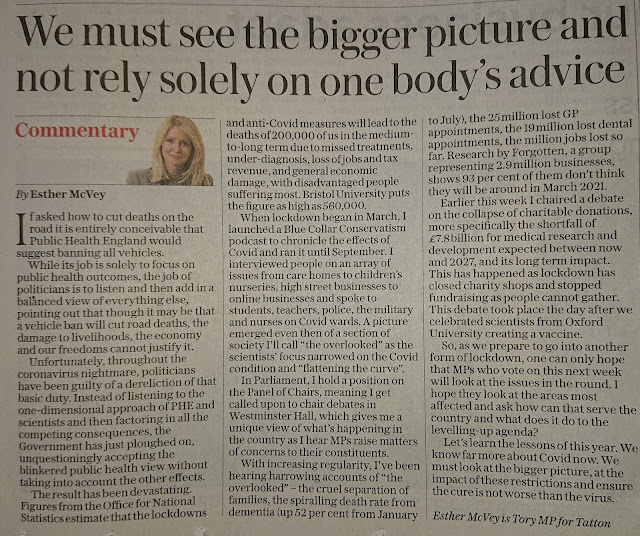Introduction
The UK government uses an organisation called the Science Advisory Group for Emergencies (SAGE) to provide it with science advice. The head of Sage is the Chief Scientific Officer (Sir Patrick Vallance at the time of writing). There is more detail on the official website: About the UK's SAGE
As you'd expect SAGE was front and centre immediately prior to and during the Covid pandemic in 2020, sometimes not for the right reasons.
I've written about a SAGE paper (Report-9) authored by Professor Neil Ferguson at Imperial College back in March 2020, which looked at possible interventions to reduce the impact of Covid on the UK & US, see: Report-9 Review, Conclusions & Recommendations on SAGE. My main observation on Report-9 is that it failed to make the blatantly obvious conclusions and also failed to identify the most obvious intervention of preventing the most vulnerable people from getting infected in the first place.
These two failures led into the hugely costly lockdowns in the UK and, more distressingly, large numbers of unnecessary deaths of elderly people during the spring and early summer.
On the 15th October, SAGE published a summary report on Segmentation, see: SAGE Summary on Segmentation 15Oct20. This article is about yet another significant failure by SAGE; their dismissal of the effectiveness of protecting the vulnerable.
Review of SAGE's Summary on Segmentation
My review was undertaken using the PDF comments option within SAGE's actual report. Below are screenshots of each page.
My primary conclusion is that SAGE continues to micrometer the brick and fails to see the bigger picture.
Their Segmentation "model" appears to want to isolate anyone who has any vulnerability to infection. This is borderline ridiculous; it's a non-starter and always would be.
So, in effect we have to agree that SAGE's Segmentation approach wouldn't work, but that doesn't mean that a pragmatic protect the vulnerable approach would also fail.
It's as if SAGE, having missed the obvious back in the spring, wants subsequently to show that the obvious wouldn't work!
Terrible science.
SAGE, in fact, do not make a strong case that protecting the vulnerable is a non-starter.
Have a look at SAGE's paper first (see what you think) and then my review, in the images below.
Summary
What appears to have happened is that, on the basis of SAGE's October 2020 Segmentation paper, the UK government becomes convinced that their sole policy options revolve around full or regional lockdowns, which is incorrect. Segmentation, as SAGE describe it, isn't an option, not surprisingly.
However, any half decent policymaker could put together a plan to assist vulnerable people, the vast majority of whom are elderly, to minimise the risk of infection via clear communication and a consensus approach. Likewise the government would have to focus resources on preventing infections within hospitals and social care; something that failed in the spring and should not happen in the winter.
As of November 2020; having spent £200-300 Billion on Protecting the NHS and (supposedly) Saving Lives via lockdowns, SAGE's misguided advice has been instrumental in the government's policy failures.
To add fuel to the fire, in early November, SAGE then persuaded the government to implement a full lockdown in England for most of November 2020. It quickly turned out that some of the data SAGE presented to the government was out of date, overly pessimistic and consequently misleading. Wonderful.
Unfortunately for the UK, its government science advisors are not fit for purpose.
The government can rightfully feel they have been let down by the science; they have been. Having said that, the government has done very little to dilute the continuous suppression and lockdown strategies from the Chief Medical Officer plus many of the epidemiological advisors within SAGE.








Comments
Post a Comment